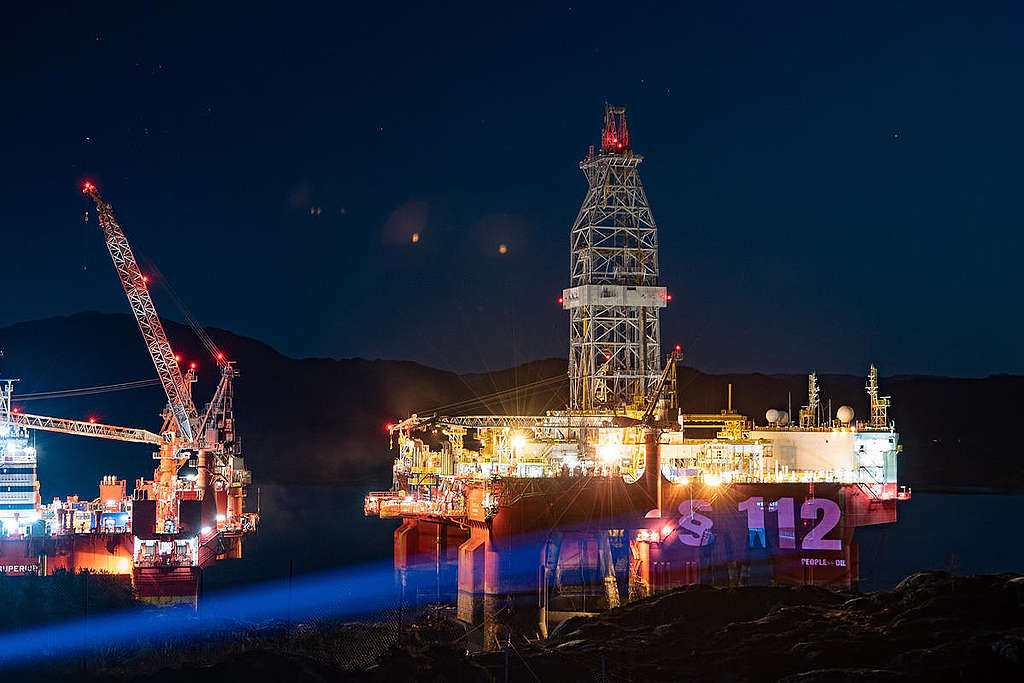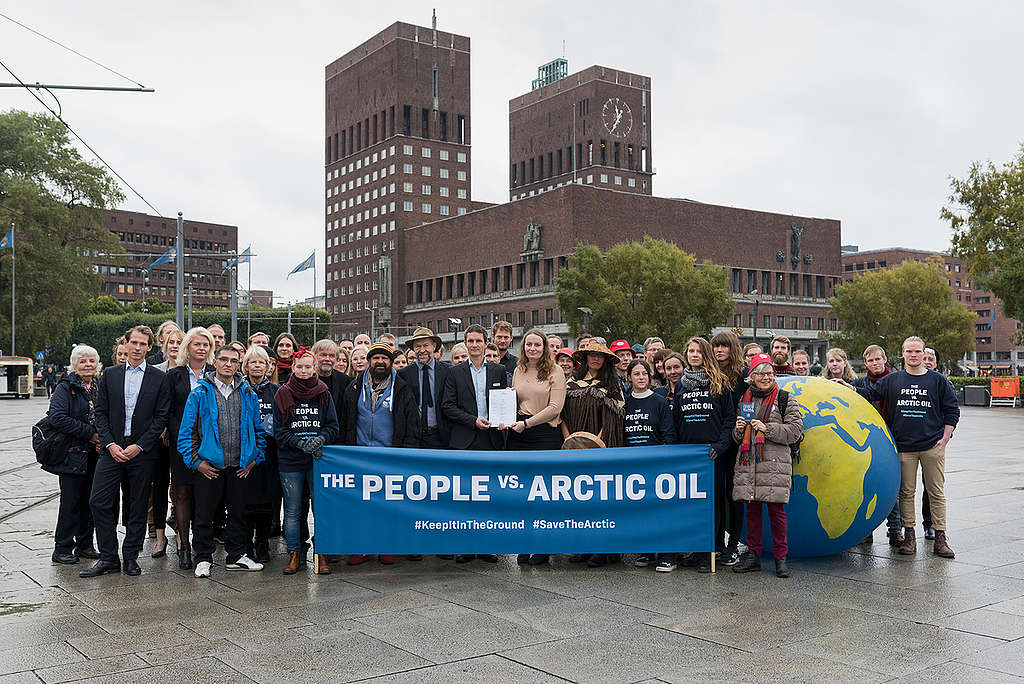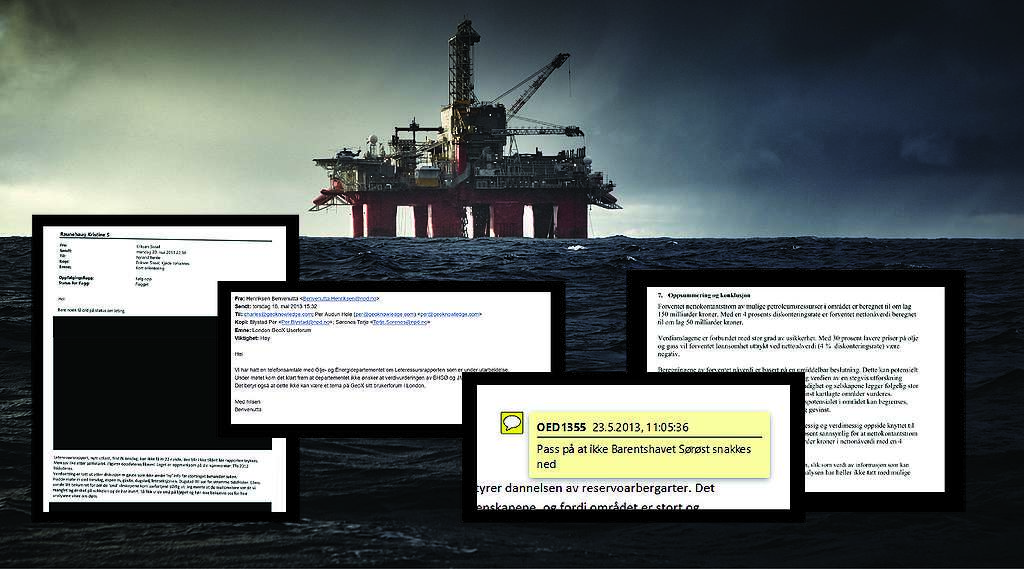
Background
Young Friends of the Earth Norway (Nature and Youth) and Greenpeace Nordic (hereafter Greenpeace) are taking the Norwegian government to court for opening up new oil fields in the fragile and diminishing Arctic.
On 18 October 2016, with the backing of a wide coalition, the two environmental organisations filed a historic legal case against the Norwegian government for granting new oil drilling licenses in a newly opened area for the first time in 20 years.
The environmental organisations claim that this violates the provisions of the Paris Agreement, and the right to a healthy and safe environment protected by the Norwegian Constitution. The case was heard in the Oslo District Court in November 2017, and then again in the Court of Appeal in Oslo in November 2019. It is the world’s first case to challenge drilling for new oil and gas based on the Paris Agreement, and it is the first time the rights contained in Norwegian Constitutional Article 112 is invoked in Court.
On 23 February 2020, the plaintiffs filed an appeal to the Supreme Court that was accepted and the court hearing starts 4 November 2020.
The plaintiffs
Young Friends of the Earth Norway is the largest environmental youth organisation in Norway. They have more than 60 local groups across the country which work with local environmental causes. They have more than 9000 members. They are well-respected in Norway, where they are the youth branch of the Norwegian chapter of Friends of the Earth.
Greenpeace is an independent global network that acts to change attitudes and behavior, to protect and conserve the environment and to promote peace. Greenpeace does not accept money from governments, political parties or corporations. It is the independent regional office Greenpeace Nordic that is co-plaintiff in this case.

Since Young Friends of the Earth Norway and Greenpeace filed the case on 18 October 2016, two organisations have joined the lawsuit as interveners on the side of the plaintiffs – the Grandparents’ Climate Campaign and Friends of the Earth Norway.
Five organisations have submitted amicus curiae briefs in support of the plaintiffs. In general, these submissions are filed by a non-party to a legal case in order to offer additional information to the Court and help explain certain relevant issues. Under Norwegian Civil Procedure (Dispute Act Section 15-8) the purpose of the submission is to shed “light on matters of public interest that are at stake in a case”. The amici, or friends of the court, have a strong interest in the case although they are not parties. The submission will assist the court in illuminating an issue on which the amici have particular expertise.
From the filing of the case at first instance, these organisations have filed amicus briefs: the Yale Law School Allard Lowenstein Human Rights Clinic, the Center for International Environmental Law (CIEL), and The Environmental Law Alliance Worldwide (ELAW). These organisations have petitioned the Supreme Court to consider their submissions. New to this legal round are briefs filed by two UN Special Rapporteurs (on Human Rights and the Environment and Toxic Substances and Human Rights) and a brief by the Norwegian Institute for Human Rights (NIM) supporting the environmental organisations’ position.
Companies in the 23rd licensing round
The 13 oil companies that were granted license blocks in the 23rd licensing round in the Barents Sea are:
- Equinor (formerly Statoil) (Norway)
- Capricorn, Spirit Energy (formerly Centrica) and Tullow (UK)
- Chevron and ConocoPhillips (USA)
- DEA (Germany)
- Det Norske (merged with BP) (Norway)
- Idemitsu (Japan)
- Lukoil (Russia)
- Lundin Petroleum (Sweden)
- OMV (Austria)
- PGNiG (Norway/Poland)
Since the lawsuit was filed, two companies – Chevron and Tullow Oil Norge – have sold their share in the licenses. PGNiG’s license is no longer active. Centrica Resources and Bayerngaz Norge have merged into Spirit Energy. Sval Energi AS took over Capricorn Norge AS in 2019. Also, Aker BP has bought shares and secured operatorship of one active license.
Norway’s state-owned oil company Equinor (formerly Statoil) has conducted a major drilling program in the Barents Sea from 2017 to 2020, including in the most northern blocks ever licensed on the Norwegian continental shelf. So far, no major discoveries have been made with the result that Equinor has scaled down its activities in the most northern and eastern licenses. Equinor was founded in 1972 as a state-owned oil company and is still 67 percent owned by the Norwegian State. It is thus particularly questionable that Norway – committed to ambitious climate targets and Arctic protection – allows its own oil company to pursue Arctic drilling.
Timeline
2016
22 April: Norway signs the Paris Agreement
18 May: The Norwegian government offers new oil licences in the Arctic
10 June: The Norwegian government awards new oil licences in the Arctic
21 June: Norway ratifies the Paris Agreement
18 October: Greenpeace and Young Friends of the Earth file lawsuit
2017
14 February: The Oslo District Court announces trial dates
11 July: the Grandparents’ Climate Action joins the court case as an intervener on the side of the plaintiffs
14 November: Climate case is heard in the Oslo District Court
2018
4 January: The Oslo District Court presents its judgement
5 February: Young Friends of the Earth and Greenpeace appeal the decision of the Oslo District Court, and asks for a direct appeal to Supreme Court
12 April: Request to proceed directly to the Supreme Court is denied. The case is forwarded to the Court of Appeal
2019
12 August: Friends of the Earth enters the court case as an intervener on the side of the plaintiffs
5 November: Climate case is heard in the Court of Appeal in Oslo
2020
22 January: The Court of Appeal presents its judgement
23 February: Young Friends of the Earth and Greenpeace appeal the decision of the Court of Appeal
20 April: The Supreme Court accepts the appeal of the climate lawsuit
23 September: The Supreme Court grants the plaintiffs free legal representation throughout the Supreme court
4 November: Climate case is heard in the Supreme Court until 12 November
The Paris Agreement
Norway was among the first countries in the world to sign the Paris climate agreement and the first industrialized nation to ratify it. The Paris Agreement shows that the countries which have signed the agreement agree on:
«Holding the increase in the global average temperature to well below 2°C above pre-industrial levels and pursuing efforts to limit the temperature increase to 1.5°C above pre-industrial levels, recognizing that this would significantly reduce the risks and impacts of climate change.»
The 1.5°C goal of the Paris Agreement means that Arctic oil must not be burned. In light of climate science and the sheer amount of oil currently discovered or in production, this oil has to stay in the ground in order to stay below a 1.5°C temperature increase. Developed nations such as Norway committed to taking the lead and enacting economy-wide emissions reductions. Granting new licences in the Arctic cannot be reconciled with what Norway committed to when it signed and ratified the Paris Agreement.
The Norwegian Constitution Article 112
Based on the Norwegian Constitution Article 112 we are challenging the Norwegian government’s decision to award new oil licences in the 23rd licensing round, made in June 2016. Article 112 of Norway’s Constitution, contained in the Human Rights section, was almost unanimously passed by Parliament in 2014. This is the official translation.
Article 112
“Every person has the right to an environment that is conducive to health and to a natural environment whose productivity and diversity are maintained. Natural resources shall be managed on the basis of comprehensive long-term considerations which will safeguard this right for future generations as well.
In order to safeguard their right in accordance with the foregoing paragraph, citizens are entitled to information on the state of the natural environment and on the effects of any encroachment on nature that is planned or carried out.
The authorities of the state shall take measures for the implementation of these principles”.

UN rapporteur calling for an end to Norway’s search for new oil
The UN Special Rapporteur on human rights and the environment Dr David Boyd highlighted the “Norwegian paradox” and the need for a just transition after his recent visit in September 2019. In his end of mission statement, Boyd stated:
«(…) The Norwegian paradox is that its leadership in some aspects of addressing the global climate emergency is enabled by wealth generated by a large petroleum industry. Greenhouse gas emissions from this sector are well above 1990 levels and exploration for additional oil and gas continues in Norway, despite clear evidence that human society cannot burn existing reserves of oil, gas and coal while meeting the targets established in the Paris Agreement.
To provide international leadership on climate change – the paramount human rights challenge facing humanity today – Norway should stop exploring for additional oil and gas reserves, stop expanding fossil fuel infrastructure, and harness Norwegian wealth and ingenuity to plan a just transition to a fossil-fuel free economy. Norway, as one of the world’s wealthiest nations and one of the world’s leading producers of oil and gas, must accept substantial responsibility for leading efforts in mitigation, adaptation, and addressing loss and damage.»
Read the full statement here or his amicus brief to the Supreme court here.
Committee on Economic Social and Cultural Rights and the Committee on the Elimination of Discrimination Against Women
These two international bodies have concluded that the expansion of fossil fuel extraction in the Arctic is contrary to the human rights obligations of Norway.
In April 2020, in its concluding observations on Norway, the Economic Social and Cultural Rights Committee’s Report voiced its concern on the expansion of exploration and exploitation of fossil fuels in the Arctic and their impact on global warming and urged Norway to reconsider this decision.
In November 2017, the Committee on the Elimination of Discrimination Against Women expressed its concern regarding Norway’s expansion of fossil fuel extraction in the Arctic due to its inevitable greenhouse gas emissions as climate change disproportionately impacts women and recommended that Norway revises its policies.
Judgement by the Oslo District Court in 2018
On 4 January 2018, the Oslo District Court found the Norwegian government not responsible for breaching the Constitution. However, the Court did find that the right to a healthy environment is protected by the Constitution and the Government must uphold those rights.
In particular, the court stated that the Norwegian State is not responsible for the carbon emissions connected to the burning of Norwegian oil and gas outside of Norway. Following this, the court found the impact of the decision to not be in breach of the constitution. Further, the judgement did not accept that the positive benefits of selling oil drilling sites were wildly overstated in government reports and that the environmental impacts of the decision were not thoroughly assessed.
The organisations stated on the day of the judgement:
«The demand for immediate action against climate change may not have been heard by the Norwegian government or courts, but every environment defender has heard the millions of people across the world who want Arctic protection. This decision should serve to shape the playbook which is being used everywhere by people taking their governments’ to court to protect their basic human right to a healthy environment.
We have shown that the Norwegian Constitution gives future generations the right to a safe and healthy environment. We see this as an important step for stronger protection of the environment, that can serve as inspiration for youth all around the world.»
Rationale for the appeal of the District Court judgement
On 5 February 2018, the organisations appealed the judgement with the aim of taking the legal dispute directly to the Supreme Court of Norway. Instead, we were referred to the Court of Appeal in Oslo. The case was heard again starting on 5 November 2019.
In the Norwegian system, the law provides the right for a full retrial at the appeals court level, and the arguments by the plaintiffs were similar to the arguments provided in Oslo District Court.
Additionally, since the judgement, the IPCC has released three new Special Reports which amplify the severe consequences of not adhering to the emissions targets set out in the Paris Agreement, and which confirm the science as it stood at the time of the decision by the Norwegian government to grant licences in the 23rd licencing round.
Moreover, UNEP, Cicero and others have released at the end of 2019 the Production Gap Report, stating that failing to take measures to curb fossil fuel production and supply means that the temperature targets will not be met. The report concludes that «with respect to fossil fuels the production gap is even larger than the emissions gap» (Production Gap Report, page 14).
Additionally, some landmark judgements have come down across the globe. In particular in the Urgenda case, where the Dutch Supreme Court has sided with the plaintiffs against the State of the Netherlands on the merits of Dutch climate change commitments. The People vs. Arctic Oil court case also bears a resemblance to the recently decided Gloucester Resources v. Minister for Planning case from New South Wales, Australia, in that it concerns the effects of decisions taken within a country on the international climate, through the exported emissions from fossil fuels. In the case of Gloucester Resources, the judgement bars the expansion of a coal mine on climate grounds. Both judgements strengthen the arguments brought forth by the plaintiffs in the Norwegian case and provide comparative law for the judges of the Court of Appeal.
We stood by the fact that Norway is indeed responsible for the emissions caused by the oil and gas it exports, in addition to its territorial emissions, and that this needs to be taken into account by the judge. The argument was supported by recent research showing the climate effect of curbing fossil fuel extraction, as well as on the slim remains of the carbon budget left before overshooting the 1.5 emissions target set out in the Paris Agreement.
Judgement by the Court of Appeal 2020
On 22 January 2020, the Court of Appeal found that the Norwegian State did not breach the Constitutional right to a healthy environment. However, the Court did find that this right is protected and the Government must safeguard it for current and future generations. The Court of Appeal also held that in establishing whether the government is protecting this right, all GHG emissions from Norwegian oil, even if exported abroad, must be taken into account.
The Court of Appeal found that the harm caused by the Arctic oil permits is uncertain, and can not yet be considered large enough to constitute a violation of the Constitution and that the state is taking sufficient climate action to remedy any damage. Despite this, the judgement is a big step closer to victory. The most important thing is that the Court of Appeal states that Norway is responsible for emissions from Norwegian-produced oil which is burned in other countries.
The Court of Appeal additionally found that the case raises important principles pertaining to the environment and the living conditions for current and future generations. Thus it has given an exceptional ruling that, although they didn’t win the case, Greenpeace and Young Friends of the Earth should not bear the government’s legal costs from the District Court or the Court of Appeal.
The organisations stated on the day of the judgement:
«We are happy the Norwegian Court of Appeal acknowledges current and future generations’ right to a healthy environment and that right also includes the duty to take into account the full emissions from the burning of Norwegian oil, wherever that takes place. This is an important legal victory on the right to a healthy environment under the Norwegian Constitution.
This is a big step closer to guaranteeing our future and sending a message that we can’t afford to drill for new oil. The Norwegian Court of Appeal is standing behind the constitutional right to a healthy environment, and finding that the Norwegian government could be responsible for emissions made by Norwegian oil burned abroad.
Still, the Court finds that the threshold for invalidating the oil drilling licences has not yet been breached. The co-plaintiffs will appeal the judgement to the Supreme Court, as it is clear that this necessitates further review by the judiciary.»
Rationale for appealing to the Supreme Court
On 23 February 2020, the organisations appealed the judgement to the Supreme Court of Norway.
In the Norwegian system, the Supreme Court is to provide judicial review in areas where the law is unclear. The Supreme Court also has a responsibility for the development of justice, within the framework of the legislation, where new social problems require it. In order for a case to be admissible, it must raise fundamental questions beyond the specific case or, for other reasons, be particularly important to consider.
As this case is the first to invoke Article 112 of the Norwegian Constitution before the court and raises fundamental principles, we found it important to appeal all the way to the Supreme Court. This will hopefully give clarity as to the meaning of Article 112’s right to a healthy environment and the obligations of the State.
The judgement of the Court of Appeal reaffirmed and strengthened the interpretation of Article 112, stating that «climate is part of the environment». The judgement signalled that all emissions must be viewed in light of the world’s total carbon budget and that Norway has responsibility for the emissions caused by the export of Norwegian oil and gas.
The plaintiffs still believe that the state has exceeded the threshold of acceptable CO2-emissions by handing out the 10 oil licenses in the 23rd licensing round.
Supreme Court
On 23 April 2020, it was confirmed that the Supreme Court will accept the People vs Arctic Oil climate case. Court dates are set to 4 November until 12 November.
The case will be a plenary trial, with all 19 judges of the Supreme Court present. This only happens in very special cases. The Supreme Court has also decided to award the plaintiffs free legal costs, which also only happens rarely and on especially important cases. Due to the COVID-19 pandemic, the hearing will be held digitally.
The arguments from the Court of appeal will be presented in the Supreme Court as well, while further emphasizing the violations to the European Convention on Human Rights Article 2 (right to life) and Article 8 (right to private and family life) brought by this drilling in the Arctic. In December 2019 the Supreme Court in the Netherlands ruled in favour of Urgenda finding that the Dutch State had failed to safeguard these European Convention rights due to the insufficiency of this convention and ruled that the current Dutch climate policies were not ensuring these rights for citizens.

Suppression of evidence
In 2020 it was revealed that the Ministry of Petroleum and Energy has withheld important information which shows that an opening of new oil fields in the Barents Sea could lead to a net economic loss for Norway. The Norwegian parliament approved the 2013 opening of a new area for oil activities in the Barents Sea based on misleading facts. The until-then secret document has been revealed as part of the People vs. Arctic Oil climate lawsuit as the case is taken to the Supreme Court.
In this connection, the Government Advocate submitted a memorandum to the Supreme Court on 21 August 2020, which had so far been unknown to the plaintiffs and the general public.
It shows that in the spring of 2013, the current government presented a report to the Parliament with a proposal to open the Barents Sea southeast (BSSE) for oil drilling. In connection with this proposal, an impact assessment (IA) was made, which contained a financial assessment. This was the last assessment the Parliament received before they considered the opening of new oil licenses in the Arctic. The economic assessments are based on two very general scenarios («high» and «low»). As presented to the Parliament, they showed that the oil business in those areas would be very profitable.
The plaintiffs to the climate lawsuit have already shown that these calculations were subject to major errors. Throughout this litigation, the State has dismissed these errors as insignificant. Now it also turns out that the Ministry of Petroleum and Energy has been sitting on updated calculations they did not present to the Parliament, which shows that the profitability of the oil fields is questionable.
International relevance
The climate lawsuit against the Norwegian government can set an international precedent. Laws in over 100 countries explicitly recognize the right to a healthy environment. Because these rights are universal, judges around the world are taking into account how other jurisdictions are upholding these rights. In addition, affirming the responsibility of states for their GHG emissions, even after export and the responsibility to take measures to curb the expansion of production and supply of fossil fuels will be significant as civil society tackles the climate crisis in courtrooms around the world. Therefore, as with the Urgenda case in the Netherlands, we can expect that courts around the world will look to the People vs. Arctic Oil to guide and inspire the interpretation of this right in their domestic legal systems.
The judgement from the Supreme Court is expected to come from 1-3 months after the court hearings end.
It may be that after November 2020, Norway becomes an exporter of climate justice.
